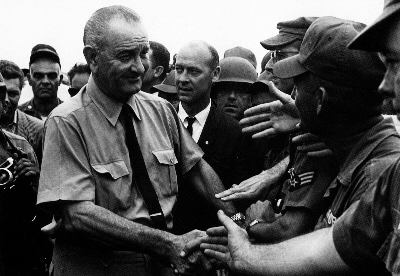History
A Divided Union
Lyndon Johnson ‘The Great Society’
After one year as President he faced a re-election, he won a victory partially because of American Public sympathy towards Kennedy.
He wanted to take Kennedy’s work further. He declared war on poverty and injustice but unlike Kennedy he doesn’t have a reputation as a great President. Conservatives thought badly of him because of his great welfare spending while liberals disliked the Vietnam war. His ‘great society’ was largely forgotten.
Johnson wasn’t a show man like Kennedy but was a great politician, nearly all of his measures were passed by Congress and he had such influence he gained great power over the Vietnam War.

Johnson meets the troops
Civil Rights under Johnson
1964 Civil Rights Act -- Johnson signed the Civil Rights Act on 2nd July 1964, which made it illegal for local government to discriminate in housing and employment. The summer of 1964 is often called the ‘freedom summer’.
1965: Selma March -- King targeted areas where he felt discrimination was worst. He organised the Selma march, it was banned by the authorities but many went ahead anyway without King. They were attacked. King later organised a token march and turned back after a short distance. This compromise avoided much violence but annoyed many black activists. EFFECT -- Johnson pushed through the Voting Rights Bill
1965: Voting Rights Bill -- Black people could now vote without intimidation. A number of black mayors were now elected.
1965-1967: Race Riots -- However the period saw a growth in racial tensions with rioting and many deaths.
1968 -- Martin Luther King assassinated
WHY WERE THERE SUCH ADVANCEMENTS IN CIVIL RIGHTS?
One issue was tackled at a time, non-violent tactics gained widespread
support, protest groups highlighted discrimination, the Supreme Court
played an important role, discrimination shamed America internationally
and Kennedy and Johnson were committed to Civil Rights.
The economy under Johnson
Johnson cut taxes, helping the better off, improved transport links and increased University funding. He also introduced consumer laws, which meant manufacturers had to label goods fairly and gave people the right to return goods.
BUT
Inflation and government spending rose dramatically due to his welfare
policies and the Vietnam War. US companies were also increasingly investing
their profits abroad, which did little to help reduce unemployment levels
at home.
Poverty under Johnson
The Medical Care Act 1965 put health care funding along the lines of Britain’s helping the elderly and families on low income. He increased minimum wage, increased funding to the Aid of Families with Dependent Children (AFDC), poorer families also received food stamps The VISTA programme tried to create work in poor inner cities, the Head Start and Upward Bound programmes tried to impress on people the importance of education, he also improved education in poorer areas, Job Corps helped school dropouts find work and he also helped to improve inner city areas and give top-ups to families to help pay the rent.
After 1968 Johnson decided not to run for President again, with race riots, high inflation, high unemployment, government spending out of control and the Vietnam War at its height he believed he would have lost. This ended eight years of Democrat Presidency.
THE KENNEDY MYTH
History has been more sympathetic towards Kennedy than Johnson; Kennedy
is considered by many as one of the best US Presidents, while Johnson
is seen as a poor President who led to race riots, high inflation and
out of control government spending. This is mainly due to Kennedy’s
assignation creating a wave of public sympathy. Most of the problems that
occurred under Johnson started with Kennedy, for example increased influence
in Vietnam and the divide over Civil Rights. People also accredit Kennedy
as the man who prevented a nuclear war in the Cuban Missile Crisis (the
US discovered the USSR was constructing nuclear weapon facilities in communist
Cuba, leading to high tensions between the US and USSR); however it was
Kennedy’s poor judgement at the Bay of Pigs Fiasco (a failed attempt
by the CIA to train Cuba exiles in an attempt to overthrow Fidel Castro
and Communist Cuba) that indirectly resulted in nuclear missiles being
sited in Cuba.
Reference Tools
Dictionary
Thesaurus
Maps
Scientific Calculator
Periodic Table
Translator
Unit Conversion
Divided Union
Introduction
Post War
The ‘Red Scare’
Civil Rights Movement
Non-Violent Direct Action
John F Kennedy
Lyndon Johnson
Growth of Black Power
The Woman’s Movement
The Student Movement
Nixon and Watergate
Cold War
Period 1945 - 1962
Period 1956 - 1962
Period 1962-1969
Period 1969 -1979
Period 1979 - 1985
Period 1985- 1991
